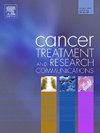Plasma biomarkers for afatinib monotherapy in EGFR-mutated non-small cell lung cancer: Novel insights from companion genomics analysis of the EXTRA study
IF 2.4
Q3 Medicine
引用次数: 0
Abstract
Objectives
Plasma-based testing with circulating cell-free DNA (cfDNA) is an active area of biomarker exploratory studies in patients with non-small cell lung cancer (NSCLC) harboring EGFR mutations. The Exosome-focused Translational Research for Afatinib study prospectively explored novel plasma biomarkers for afatinib monotherapy in patients with NSCLC harboring EGFR mutations using genomics, proteomics, epigenomics, and metabolomics. Herein, we present the results of the genomics part.
Materials and Methods
Clinical data of afatinib were matched with next generation sequencing (NGS)-based genomics data of cfDNA (n = 101) and extracellular vesicle DNA (evDNA) (n = 99) from pretreatment plasma samples.
Results
The detection sensitivity of cfDNA and evDNA mutations was 86 % (87/101) and 37 % (37/99), respectively. When cfDNA mutations were classified into tissue-matched (any EGFR mutations consistent with those identified in tissue) (n = 28), tissue-unmatched (n = 59), and mutation-undetected (n = 14) groups, cfDNA mutation status was a predictor of progression-free survival (PFS) (p < 0.01) and overall survival (OS) (p < 0.01). EvDNA mutation status was a predictor of OS (p < 0.01) rather than PFS (p = 0.48). When the tissue-unmatched cfDNA group was subclassified into EGFR-related (n = 49) and EGFR-unrelated (n = 10) groups, the EGFR-unrelated group had a median PFS and 3-year OS rate of 31.2 months and 80.0 %, respectively. EGFR-unrelated and mutation-undetected cfDNA groups (n = 24) exhibited a median PFS and 3-year OS rate of >30 months and >80 %, respectively, with afatinib monotherapy.
Conclusion
This is the first large-scale prospective study of NGS-based concurrent testing for plasma cfDNA and evDNA mutations. The findings suggest that cfDNA mutation status is a promising plasma biomarker for afatinib monotherapy.
阿法替尼单药治疗egfr突变的非小细胞肺癌的血浆生物标志物:EXTRA研究的伴随基因组学分析的新见解
目的血浆游离循环细胞DNA (cfDNA)检测是EGFR突变非小细胞肺癌(NSCLC)患者生物标志物探索性研究的活跃领域。这项以外泌体为重点的阿法替尼转化研究利用基因组学、蛋白质组学、表观基因组学和代谢组学,前瞻性地探索了阿法替尼单药治疗EGFR突变NSCLC患者的新型血浆生物标志物。在此,我们介绍基因组学部分的结果。材料与方法将阿法替尼的临床数据与预处理血浆样品中cfDNA (n = 101)和细胞外囊泡DNA (n = 99)的下一代测序(NGS)基因组学数据进行比对。结果cfDNA和evDNA突变的检测灵敏度分别为86%(87/101)和37%(37/99)。当cfDNA突变被分为组织匹配组(与组织中发现的任何EGFR突变一致)(n = 28)、组织不匹配组(n = 59)和突变未检测组(n = 14)时,cfDNA突变状态是无进展生存期(PFS)的预测因子(p <;0.01)和总生存期(OS) (p <;0.01)。EvDNA突变状态是OS的预测因子(p <;0.01)而非PFS (p = 0.48)。当组织不匹配的cfDNA组被细分为egfr相关(n = 49)和egfr不相关(n = 10)组时,egfr不相关组的中位PFS和3年OS率分别为31.2个月和80.0%。与egfr无关和未检测到突变的cfDNA组(n = 24)在阿法替尼单药治疗下的中位PFS和3年OS率分别为30个月和80%。这是基于ngs同时检测血浆cfDNA和evDNA突变的首次大规模前瞻性研究。研究结果表明,cfDNA突变状态是一种有希望的阿法替尼单药治疗血浆生物标志物。
本文章由计算机程序翻译,如有差异,请以英文原文为准。
求助全文
约1分钟内获得全文
求助全文
来源期刊

Cancer treatment and research communications
Medicine-Oncology
CiteScore
4.30
自引率
0.00%
发文量
148
审稿时长
56 days
期刊介绍:
Cancer Treatment and Research Communications is an international peer-reviewed publication dedicated to providing comprehensive basic, translational, and clinical oncology research. The journal is devoted to articles on detection, diagnosis, prevention, policy, and treatment of cancer and provides a global forum for the nurturing and development of future generations of oncology scientists. Cancer Treatment and Research Communications publishes comprehensive reviews and original studies describing various aspects of basic through clinical research of all tumor types. The journal also accepts clinical studies in oncology, with an emphasis on prospective early phase clinical trials. Specific areas of interest include basic, translational, and clinical research and mechanistic approaches; cancer biology; molecular carcinogenesis; genetics and genomics; stem cell and developmental biology; immunology; molecular and cellular oncology; systems biology; drug sensitivity and resistance; gene and antisense therapy; pathology, markers, and prognostic indicators; chemoprevention strategies; multimodality therapy; cancer policy; and integration of various approaches. Our mission is to be the premier source of relevant information through promoting excellence in research and facilitating the timely translation of that science to health care and clinical practice.
 求助内容:
求助内容: 应助结果提醒方式:
应助结果提醒方式:


